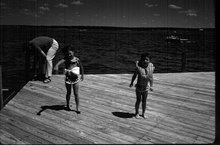
Edward Weston, Pepper, 1930, silver print, 9 1/2 x 7 9/16 inches, The Lane Collection, Museum of Fine Arts, Boston
To the extent that photography can approximate the physical, the closest it comes to actual “touch” is in the contact print. Later in his life, Sudek abandoned the enlarger for this, if you will, more intimate form of printing. The depth of detail is unsurpassed in any other method, and the result is a one-to-one correspondence between the negative and the positive, a record, so to speak, of the entire conversation between light and the photosensitive medium.
During the archaeological expeditions in the basement of my grandparent’s house, I came across a home-made contact printer. My grandfather had fashioned it out of rudimentary materials, or so it seemed. I had no idea, at the time, what it was, and abandoned it along with other artifacts of indeterminate function.
To the extent that language can approximate the physical, the closest it comes to actual “touch,” the equivalent of the contact print, is poetry. Why does this make me think of love? Embodied, disembodied--all language flowing in and out of the tactile world. In Penetrable Air, I had written this scene as witnessed by a soon-to-be-conceived child:
This scene always appeared before her both as story and memory, Did she watch this from the ceiling or the sky? waiting for the right moment to pour herself into them? She had hovered above the room for so long, disembodied, not feeling or hearing or smelling, but yearning to experience the weight of flesh, the confinement of skin, the delirious sensation of taste and touch and sound. Watching the girl on that bed below her with her eyes pressed closed like petals, looking so peaceful, as they wrapped their wings around one another like pale bats, unaware that their spirits bled in and out of one another’s bodies. The last thing she clearly remembers is this: that the little pearls of him were held inside of her; and then she just slipped in between a gasp and a sigh, into those luminous drops of fluid, and it was done.
How many times had I written and rewritten that passage, trying to strike the exact chord, to recapture something I had, at least consciously, forgotten. My body had not. Perhaps twenty years passed before I realized that much too early in life I had crossed a threshold--not merely the one that most of us eventually cross in letting go of childhood through lovemaking, but the one of entering fully into another person’s spirit, like molecules passing through a permeable membrane. I went on from that place into an exile of sorts, carrying along the misconception that each encounter would open onto that same landscape. But I had no idea what country I had left behind, or that I might never find my way back. I am still searching for evidence of my own passage, trying to find the way.



